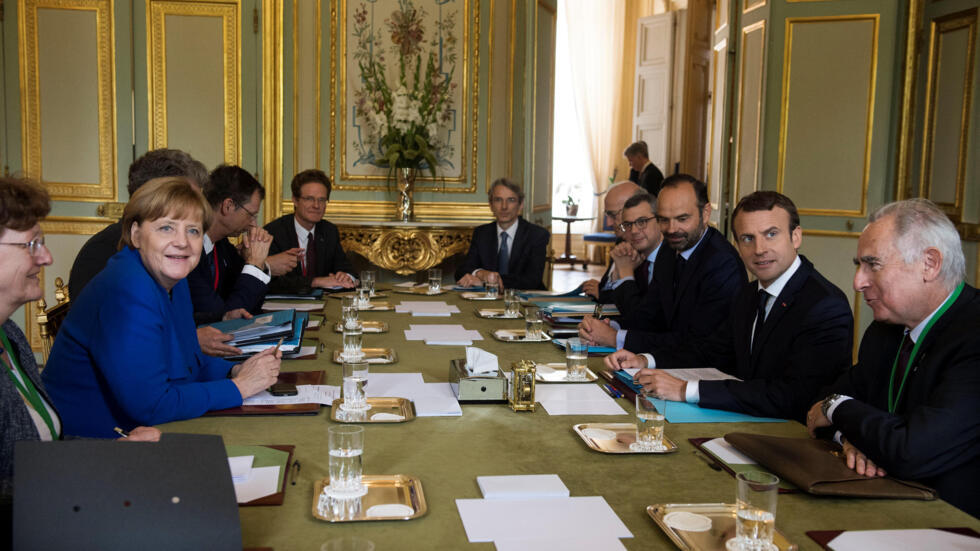Macron and Merkel put defence at heart of Paris-Berlin alliance
Paris and Berlin agreed to new European defence measures during a joint cabinet meeting in the French capital on Thursday, in a bid to showcase the Franco-German alliance and its push for greater EU integration.
Issued on:

French President Emmanuel Macron and German Chancellor Angela Merkel have agreed to develop a “new generation” of European fighter jets.
The aim of the project, according to Macron, “is to do research and development together, to use it together, and to coordinate on exports.”
French forces use the domestically produced Rafale jet, while German forces use the Eurofighter Typhoon, manufactured by a multitude of companies throughout the EU, in addition to older British aircraft.
Macron also won Merkel’s commitment to support the Paris-backed G5 Sahel, a regional anti-terrorist force comprised of soldiers from the African countries of Burkina Faso, Chad, Mali, Mauritania and Niger.
France has maintained some 3,500 special forces across the Sahel since its intervention in Mali in 2013 to fight various Islamist militant groups, while German forces in the country number around 650.
The two leaders also referred to the European defence fund, created by the EU last month with an annual budget of 5.5 billion euros, as an “important pillar of integration of the European defence sector.”
Defence-economy trade off
Defence and security are key issues for both Macron and Merkel. But so is economic reform, which could prove to be a more difficult and lengthy process.
Which is why analysts say that France and Germany could agree to a kind of trade off regarding defence and economic policy.
France, a permanent member of the UN Security Council, wants Germany to pitch in more on defence and counter-terrorism operations that could benefit the EU.
Jacques Reland, a research fellow at the Global Policy Institute, says that “France will take a leading position” on defence, especially since Merkel declared in May that Europe can no longer “completely depend” on the US.
While Germany, Europe's economic powerhouse, wants France to implement economic and labour reforms.
Eurozone reform still proves tricky
Macron has said that reforming the eurozone is one of the top priorities of his presidency.
He has proposed creating a finance minister and budget for the eurozone.
Merkel said she was open to such reforms, and agreed that “the eurozone must be stabilised and further developed” during a joint press conference with Macron on Thursday.
But she reiterated that any major reform would have to wait until after Germany’s legislative elections three months away in September.
“We need a mandate from parliament, which we will seek after the elections,” she added.
However, a mandate from German parliament to reform the eurozone may be unlikely.
"There's a very strong resistance in Germany about anything that can be seen as debt pulling or fiscal transfers from Germany to other eurozone member states,” explains Rémi Bourgeot, a French economist and analyst at the French Institute for International and Strategic Affairs.
Emily Mansfield, head France analyst at the Economist Intelligence Unit, makes a similar point. “In Germany, there’s a lot of concern about what greater risk sharing within the eurozone might mean, and in particular if that might mean that German taxpayers subsidise weaker economies elsewhere in the bloc.”
According to Bourgeot, “there could be some agreement or concessions on the part of Angela Merkel with regards to a joint budget for eurozone, but that would come after the general election in September.”
Daily newsletterReceive essential international news every morning
Subscribe